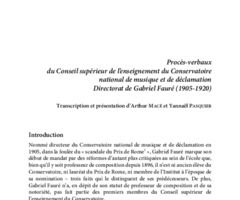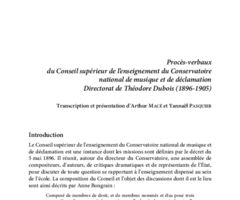
Charles-Marie WIDOR
1844 - 1937
Composer, Organist
Born into a family of organ builders, Charles-Marie Widor displayed a talent for that instrument at a very young age. After working for a time with his father in Lyon, he left—on the advice of Aristide Cavaillé-Coll, a family friend—for Brussels to take organ lessons with Lemmens and study composition with Fétis. Still under the influence of his mentor, Cavaillé-Coll, who provided unfailing lifelong support, young Widor moved to Paris and made a name for himself by playing at Saint-Sulpice as the need arose and by inaugurating the new instruments at Notre-Dame and La Trinité. With the support of Saint-Saëns and Gounod, he succeeded in obtaining the permanent post of organist at Saint-Sulpice in 1870, which placed the largest instrument in France at his disposal. This exceptional organ allowed him to develop a new style, inspired by orchestral writing, which can be seen in his organ symphonies: the first eight (opp. 13 and 42), the Symphonie gothique op. 70 (1895) and the Symphonie romane op. 73 (1900). On the death of César Franck (1890), Widor took over his organ class at the Paris Conservatoire. He completely overhauled organ teaching methods and, as a result, was the founder of the new French school. In 1896, he was appointed Professor of Composition, Counterpoint and Fugue, and his pupils included Dupré, Honegger, Milhaud and even Varèse. A member of the Institut de France in 1910, permanent secretary of the Académie des Beaux-Arts in 1914, this ardent supporter of the music of Bach was also given the task of preparing an edition of the great master’s organ works from 1911.
Documents and archives

Reports and studies











